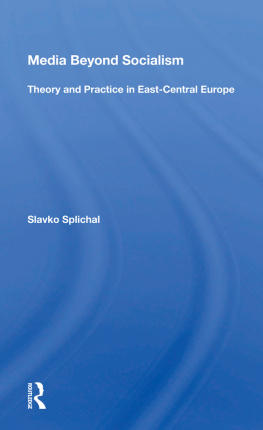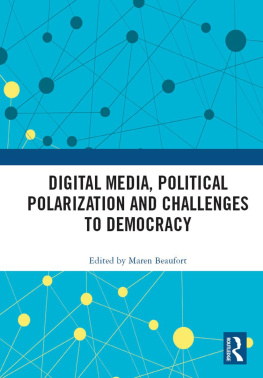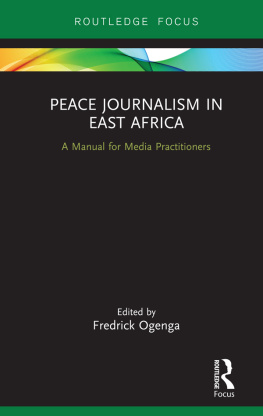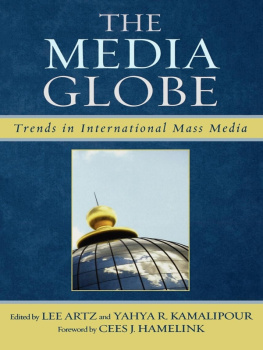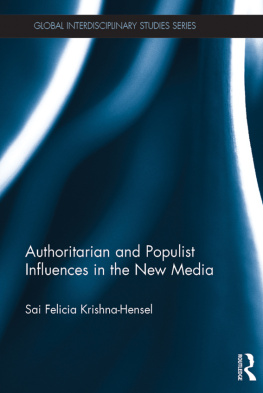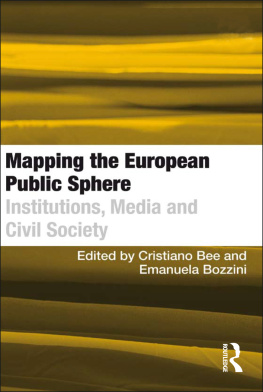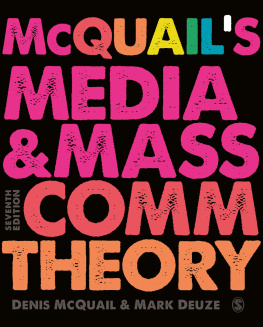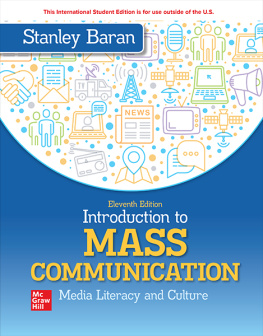Meadia Beyond Socialism
International Communication and Popular Culture
Series Editor John A. Lent, Temple University
Media Beyond Socialism: Theory and Practice in East-Central Europe, Slavko Splichal
FORTHCOMING
The Orchestration of the Media: The Politics of Mass Communications in Communist Poland and the Aftermath, Tomasz Goban-Klas
Human Rights and the Media: International Reporting as a Global Watchdog, Frederic Moritz
Asian Popular Culture, edited by John A. Lent
First published 1994 by Westview Press
Published 2018 by Routledge
52 Vanderbilt Avenue, New York, NY 10017
2 Park Square, Milton Park, Abingdon, Oxon OX14 4RN
Routledge is an imprint of the Taylor & Francis Group, an informa business
Copyright 1994 by Taylor & Francis
All rights reserved. No part of this book may be reprinted or reproduced or utilised in any form or by any electronic, mechanical, or other means, now known or hereafter invented, including photocopying and recording, or in any information storage or retrieval system, without permission in writing from the publishers.
Notice:
Product or corporate names may be trademarks or registered trademarks, and are used only for identification and explanation without intent to infringe.
A CIP catalog record for this book is available from the Library of Congress.
ISBN 13: 978-0-367-00777-5 (hbk)
This book offers a critical view of some basic issues that arose in the former socialist countries of East-Central Europe after the overthrow of the former governments and the fall of the Communist Party as the "avant-garde of the proletariat." This book focuses on the changing relationship among media, state, economy, and civil society in the period of transition from a socialist state system to a Western type of democracy. The notion of civil society and its importance to democracy is central for an understanding of the paradoxes appearing in the transitional period and, accordingly, is central to this book. Although considerable differences exist in the use of the concept of civil society, the dialecticrather than the dichotomybetween the state and civil society is highly relevant for contemporary social and political transformations and for de- and reconstruction of media systems in East-Central Europe and elsewhere.
It is clear that, in most cases, East European societies are being peacefully altered by fundamental political and economic changes. In contrast to developed superindustrial societies, these changes are not paralleled by technological developments. Whereas information and telecommunications technologies mark revolutionary changes in West Europe, North America, Japan, and some newly industrialized countriesthe "four tigers" in Asia, for exampleEast-Central Europe largely remains a typical peripheral zone in terms of technology. This makes any endeavor to catch up with the "First World" an extremely difficult task in many respects. These societies are peripheral in other ways as well. First, technological obsolescence is directly reflected by economic underdevelopment, which leaves the newly emerging democratic state and its economy at a disadvantage in the international marketplace. Second, the lack of any genuine democratic tradition makes political changes and democratization of society even more difficult. Not only do these obstacles reduce the probability of finding commonly shared objectives and make changes toward a democratic system more difficult; they can also potentially transform emerging democracies into a new form of authoritarian system.
These difficulties and conflicts are clearly reflected in the range of economic, political, and legal issues embraced by widespread discussions about media reform in East-Central Europe. This book offers some theoretical insight and empirical examination of present changes to help understand media controversies arising from recent political and economic developments.
issues, it addresses from different perspectivescapitalist and socialistthe problems of civil society, the peculiar role of the economy, and the changing role of the state. The chapter also treats the dialectic of integration and differentiation in social systems, some critical issues for the "information age," the merger of the principles of power and profit maximization in the communication sphere, and the role the media have played in the "velvet revolutions" in East-Central Europe.
looks from a comparative perspective at recent quantitative and qualitative changes in the East-Central European print and broadcast media in terms of ownership, political control, the role of the media, and journalism practice. The chapter combines a theoretical consideration of the media, based on the historical development of democratic practices, with an analysis of actual developments in East-Central Europe. It examines the fallacies in attempts to construe the developments in East European media as radical changes or departures from previous activities and provides a number of concrete examples. Theoretical discussions in the next chapters of the principal components of East-Central European media systems in transition proceed mainly from the cases presented in this chapter.
argue that the postsocialist societies are largely caught up in imitation and duplication of either West European practices (such as the rise of communication systems under private capitalism, which results in loss of control by citizens), the former authoritarian models, or both. Commercialism, paternalism, and nationalism, which tend to dominate in the postsocialist media as a result of deregulation and reregulation pressures from the top to the bottom, are discussed as major constraints to the processes of democratization.
assesses some of the possible future developments in the post-socialist societies from the perspective of groups that would like to participate in democratic media and be empowered by them. This concluding chapter looks at whether the societies that issue from the process will be democratic and, if so, what the nature of that democracy will be. In this, the mass media systems are certainly of vital importance. The chapter is aimed not at forecasting the future but rather at interpreting the present in terms of its possible implications for the future.
No doubt, this book cannot cover all the important issues emerging now in East-Central Europe or in discussions about it. Even the topic of media restructuring is too broad to be fully elaborated in a single book. My own intention is to give a broad overview of some major, and often controversial, issues and to raise some basic questions for further debate.
The writing of this book was significantly stimulated by discussions at the Slovenia-based International Colloquia on Communication and Culture, which are intended to build intellectual bridges between East and West communication research. At the third colloquium in Piran (1989), which was devoted to an East-West dialogue on democratization and the media, a group of European and North American communication researchers initiated an international comparative project on media systems in transition. The colloquium came at a critical juncture for both West European and East-Central European countries when a breathtaking pace of change dictated a reexamination of the role of major actors in, and barriers to, the realization of democratic communication, but one could not conceive (at that time) the thought of the dramatic (r)evolutions that took place a few months later in the socialist countries. Even though our initial idea was to focus on the prospects for democratic communication processes in both socialist and capitalist societies, our task became in a way simpler and less complex after the East European velvet (r)evolutions and the decay of socialism. But our task also became more complex and difficult, as well as more ambiguous, because the "research subject" in the postsocialist countries is changing with inordinate speed.

